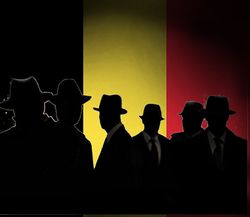Difference between revisions of "Belgium/Deep state"
(sections) |
m (→History) |
||
| Line 20: | Line 20: | ||
===19th century=== | ===19th century=== | ||
| − | The [[Berlin Conference]] of 1884-5 formalized many of the European colonial powers' claims in [[Africa]]. King Leopold II of Belgium was personally granted control oh a large, resource-rich piece of central Africa, the Congo River basin. Plunder from this provided a lot of wealth to the Belgian Court and court officials, centered on the Royal Family. The [[Belgian nobility]] has historically dominated the army and diplomatic service and continues to be influential to this day<ref>For example, Baron [[Étienne Davignon]] and Baron [[Jean Charles Snoy et d'Oppuers]] | + | The [[Berlin Conference]] of 1884-5 formalized many of the European colonial powers' claims in [[Africa]]. King Leopold II of Belgium was personally granted control oh a large, resource-rich piece of central Africa, the Congo River basin. Plunder from this provided a lot of wealth to the Belgian Court and court officials, centered on the Royal Family. The [[Belgian nobility]] has historically dominated the army and diplomatic service and continues to be influential to this day.<ref>For example, Baron [[Étienne Davignon]] and Baron [[Jean Charles Snoy et d'Oppuers]]</ref> |
==20th century== | ==20th century== | ||
Revision as of 18:19, 3 March 2022
(Deep state) | |
|---|---|
 | |
| Abbreviation | BE/DS |
| The Belgian Deep state is not yet very well documented here. | |
The Belgian Deep state is not yet very well documented here.
Contents
Functions
Brussels
- Full article: Brussels
- Full article: Brussels
Brussels is headquarters of NATO. The activities of Willem Matser have strengthened suspicion that, as Sibel Edmonds alleges, it is a conduit for large scale drug trafficking.
History
19th century
The Berlin Conference of 1884-5 formalized many of the European colonial powers' claims in Africa. King Leopold II of Belgium was personally granted control oh a large, resource-rich piece of central Africa, the Congo River basin. Plunder from this provided a lot of wealth to the Belgian Court and court officials, centered on the Royal Family. The Belgian nobility has historically dominated the army and diplomatic service and continues to be influential to this day.[1]
20th century
1900s
1910s
1920s
1930s
Paul van Zeeland was Belgian Prime minister. A suspected deep politician, he held various posts after WW2 and attended 6 Bilderberg meetings in the 1950s.
1940s
The Belgian arm of Operation Gladio was set up around the end of WW2. Later Gladio was reportedly commanded from NATO's Allied Clandestine Committee and Clandestine Planning Committee in Brussels.
In 1947 the Egmont Institute was founded [By whom?]. This was mentioned among "major national think tanks" (such as Chatham House, Clingendael etc.) in a leaked Integrity Initiative document[2]
1950s
Communist leader Julien Lahaut was assassinated by deep state groups, a murder that shocked Belgium. No-one was convicted for the murder. A politicised justice system turned a blind eye to the suspected perpetrators.[3]
1960s
1970s
There was a planned coup in 1973, in connection with the neo-fascist Emile Lecerf and elements of the Gendarmerie. A report by Major de Cock implicated several prominent AESP/CEPIC members in funding an extreme right-wing group, the NEM Clubs. A 1976 Gendarmerie report by Chief Adjutant Roger Tratsaert further alleged that the NEM Clubs had been major participants in plans for a coup d'état by elements of the Gendarmerie in the early 1970s.[4]
1980s
At Poupehan between 1982 and 1987 meetings occurred between Hubert Detremmerie, Wilfried Martens, Alfons Verplaetse and Jef Houthuys to discuss the social and economic situation of Belgium.[5]
The Coudenberg group was set up in 1984, and lasted until 1999. Members included Jan Huyghebaert (who went to 11 Bilderbergs from 1993-2010).
In 1987 Léon Lambert of the Bilderberg Steering Committee suddenly died aged 58.
Brabant Massacres
- Full article: Brabant Massacres
- Full article: Brabant Massacres
Between 1982 and 1985, 28 people were killed in a series of attacks called the Brabant Massacres. Commentators including Alan Francovich suggested that these were carried out through Operation Gladio.
1990s
In 1991, André Cools, a leading Belgian socialist politician, was assassinated in Liège.[6]
In 1992 the BBC broadcast Alan Francovich's Operation Gladio Film, which made extensive use of primary sources, focusing almost exclusively on Gladio in Italy and in Belgium. Roger Lallemand headed the Belgian Parliamentary inquiry into Gladio.[When?]
Dutroux Affair
- Full article: Dutroux Affair
- Full article: Dutroux Affair
The Dutroux Affair was a VIPaedophile scandal which helped expose the hand of the deep state. Marc Dutroux knew Paul Latinus of the Westland New Post.[7]
Groups
- Le Cercle - Has at least 7 known visitors.[8]
- Bilderberg/Guests/Belgium - 78 known Belgian participants
- Société Générale de Belgique -a large bank merged out of existence in 2003 which had tentacles all over society.
Most Frequent Bilderberg visitors
- Étienne Davignon - 32 visits Bilderberg chairman
- Jean Charles Snoy et d'Oppuers - 16 Bilderberg visits
- Daniel Janssen - 16 Bilderberg visits, Trilateral Group, European Round Table of Industrialists
References
- ↑ For example, Baron Étienne Davignon and Baron Jean Charles Snoy et d'Oppuers
- ↑ Document:Progress report on establishing national clusters
- ↑ https://www.brusselstimes.com/belgium/178260/the-mysterious-murder-of-belgiums-communist-leader-julien-lahaut-solved-without-any-perpetrators-ever-brought-to-justice
- ↑ David Teacher ROGUE AGENT, 6th edition 2021, page 78
- ↑ Hugo De Ridder, Omtrent Wilfried Martens, Lannoo. 1991
- ↑ https://www.brusselstimes.com/news/belgium-all-news/177947/on-this-day-30-years-ago-a-political-assassination-in-liege/
- ↑ http://visupview.blogspot.com/2016/03/belgium-into-heart-of-darkness-part-iii.html
- ↑ https://wikispooks.com/wiki/Le_Cercle/Guests/Nationality
